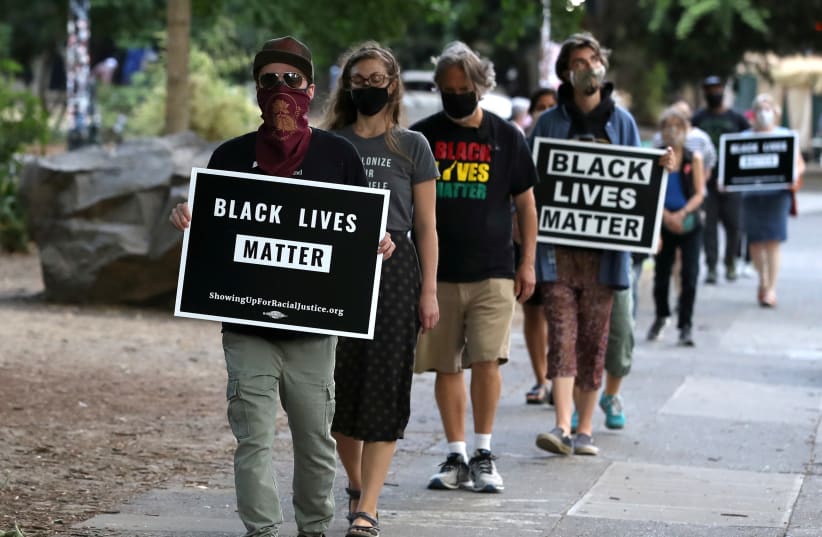"I have not only claimed these identities as my own when I had absolutely no right to do so — when doing so is the very epitome of violence, of thievery and appropriation, of the myriad ways in which non-Black people continue to use and abuse Black identities and cultures — but I have formed intimate relationships with loving, compassionate people who have trusted and cared for me when I have deserved neither trust nor caring."Krug attended Hyman Brand Hebrew Academy, a nondenominational Jewish school, and her family attended Congregation Ohev Sholom in suburban Prairie Village, a person who grew up in the community has told the Jewish Telegraphic Agency.She goes on to admit that she knew that what she was doing was "wrong — unethical, immoral, anti-Black, colonial," and to offer no apology, although she explains that she has been dealing with "unaddressed mental health demons" all her life."But mental health issues can never, will never, neither explain nor justify, neither condone nor excuse, that, in spite of knowing and regularly critiquing any and every non-Black person who appropriates from Black people, my false identity was crafted entirely from the fabric of Black lives," she wrote, adding: "That I claimed belonging with living people and ancestors to whom and for whom my being is always a threat at best and a death sentence at worst."The article has provoked anger on social media, not least as some are claiming that the confession isn't an unforced coming-clean, but the result of being Krug being found out.Hari Ziyad, a black author and screenwriter took to Twitter to express his dismay. "Jess Krug... is someone I called a friend up until this morning when she gave me a call admitting to everything written here. She didn't do it out of benevolence. She did it because she had been found out,' Ziyad tweeted.He added: "I always knew there was something off. It was in her persistent negativity and jealousy, her always needing to prove her authenticity at the expense of everything else."Meanwhile, Dr. Yomaira Figueroa, an associate professor of Afro Diaspora Studies at Michigan State University has tweeted that she didn't know Krug personally, but that she understood Krug was about to be outed by her fellow academics."The only reason Jessica Krug finally admitted to this lie is bec on Aug 26th one very brave very BLACK Latina junior scholar approached two senior Black Latina scholars & trusted them enough to do the research & back her up," Figueroa tweeted."Those two scholars made phone calls & reached out to other senior scholars & institutions with proof. There was no witch hunt, but there was a need to draw the line. Krug got ahead of the story because she was caught & she knew the clock was ticking bec folks started to confront her & ask questions."Figuerola added that she thought it sad that Krug felt the need to lie, tweeting "let historians tell it, her work is actually good, chick is smart- so why lie?"However, she said the deception also raised questions and had been damaging to minority communities."She made a living & a whole life out of parroting Black Rican trauma and survival," Figuerola tweeted. "She needs to account for everything she has taken, everything she has gained, all that she stole by creating this identity & shrouding herself with Black & Latinx folks who defended, supported, and lifted her up. What does restitution look like when she won awards, grants, & fellowships for underrepresented folks?"Krug appeared to agree in her article, writing: "I don’t know how to fix this. I am attempting to lay out a timeline of my deceit to better understand all whom I have violated and how, and to begin to imagine how to restore, to address, to redress… But I can’t fix this. I have burned every bridge and have no expectation that any of my relationships are flame resistant."Following the admission some publications began withdrawing her work from their platforms.RaceBaitr posted a statement to their Twitter account in which they apologized for "not taking seriously enough some of your warnings," and promised to do better to vet and elevate "writers committed to the liberation of Black people."The case has drawn comparasons to that of Rachel Dolezal, who was president of the Spokane, Washington chapter of the National Association for the Advancement of Colored People (NAACP) and an instructor in Africana Studies at Eastern Washington University when she was forced to resign, after her parents revealed that she was, in fact, ethnically white.Who Blacked up better? Who's more believable as a Sistah? Rachel Dolezal Jessica Krug pic.twitter.com/DWft46ZnUJ
— Zande #BLM (@KingZairois) September 4, 2020
African American history professor admits she lied about being black
Jessica A Krug has built her academic career upon a black identity she now admits is not her own.
